01 Jan 2015
Am I Abusing Alcohol?
If you’ve ever thought about how much you drink, if your habits are healthy or if you abuse alcohol, you’re ahead of most people. Many people abuse alcohol but avoid thinking critically about their actions or what it means.
Do You Have A Problem With Abusing Alcohol?
It’s easier to ignore potential problems with drinking, but it can also be confusing to understand what constitutes normal drinking, alcohol abuse and alcoholism. While alcohol abuse doesn’t necessarily lead to alcoholism, it can put you on that path. Learn more about what this means and find out if you abuse alcohol.
What Is Moderate Drinking?
 There’s no hard and fast rule for what constitutes alcohol abuse, but there are guidelines for what’s considered to be moderate drinking. Some experts would say that anything over moderate drinking is abuse, while others would argue that this viewpoint is too extreme.
There’s no hard and fast rule for what constitutes alcohol abuse, but there are guidelines for what’s considered to be moderate drinking. Some experts would say that anything over moderate drinking is abuse, while others would argue that this viewpoint is too extreme.
According to guidelines set by the U.S. Department of Agriculture and the Department of and Human Services, moderate drinking for a woman is up to one drink per day and for a man up to two drinks per day.
What Are The Signs Of Alcohol Abuse?
Everyone is different and responds in varied ways to alcohol. Some people can drink more and be less affected. What’s more important than the guidelines for moderate drinking are the behaviors, consequences and motivations regarding your drinking. Look critically at your drinking habits for these signs of alcohol abuse:
- Your drinking causes you to neglect responsibilities – This could mean that you forget to pick up the kids from school or that you can’t drive them to activities because you are under the influence. Maybe you neglect to spend time with an elderly parent because you would rather be drinking.
- You drink to relax or to cope with negative emotions – Using alcohol to feel better is called self-medication and is a sign of abuse. The occasional drink after work to unwind is not usually a problem, but can be when it becomes a habit.
- You drink even when it could be dangerous to do so – For example, when you are about to get behind the wheel of your car or operate another type of machinery.
- You drink in spite of the problems it causes in your relationships – If your partner urges you to drink less and you don’t, or if you fight about your drinking patterns often, you are letting alcohol deteriorate your relationship.
- Your drinking causes legal problems – Such as a DUI or an arrest for behavior caused by being drunk.
What Is Alcoholism?
If you can identify any of the above signs in your behaviors when it comes to drinking, you’re abusing alcohol. It’s important not to confuse this with alcoholism.
Alcoholism means being physically dependent on alcohol. Alcoholics drink a lot every day. They can’t control how much they drink, even if they want to cut down. They feel physically sick if they can’t drink. There are big and important differences between abusing alcohol and being an alcoholic.
How To Change Your Drinking Patterns
Abusing alcohol doesn’t always lead to alcoholism. Most people who abuse alcohol can change their behaviors before it gets to that point. You have the ability to make changes now, for the better.
Enlist the support of a friend or partner and tell this person that you want to cut back. Come up with better ways to cope with stress, such as exercise or meditation. Set goals that are attainable and work toward them.
If you try these strategies and still find it hard to change your patterns, consider working with a therapist or counselor. With a little guidance you can learn to have a healthy relationship with alcohol.
If You Or Someone You Love Is Abusing Alcohol – Don’t Hesitate –
Call Us Now To Begin A Life Of Healing And Freedom!
When you are guiding a loved one through the process of getting help for alcohol abuse, it can be easy to feel overwhelmed. You want the best for the person you care about, but there are so many choices. How do you know which facility and which type of program is right and will be most effective? The first step is to understand what the options are. Then you can make an informed and personal decision about seeking care.
Alcohol Treatment Options – How To Choose The Right Alcohol Treatment Program
When it comes to care for alcoholism and alcohol abuse, there is no one-size-fits-all option. Addiction care is personal and most effective when it is individualized to meet the particular needs of each patient.
Your loved one needs the type of care that will work best for him. These are some of the options:
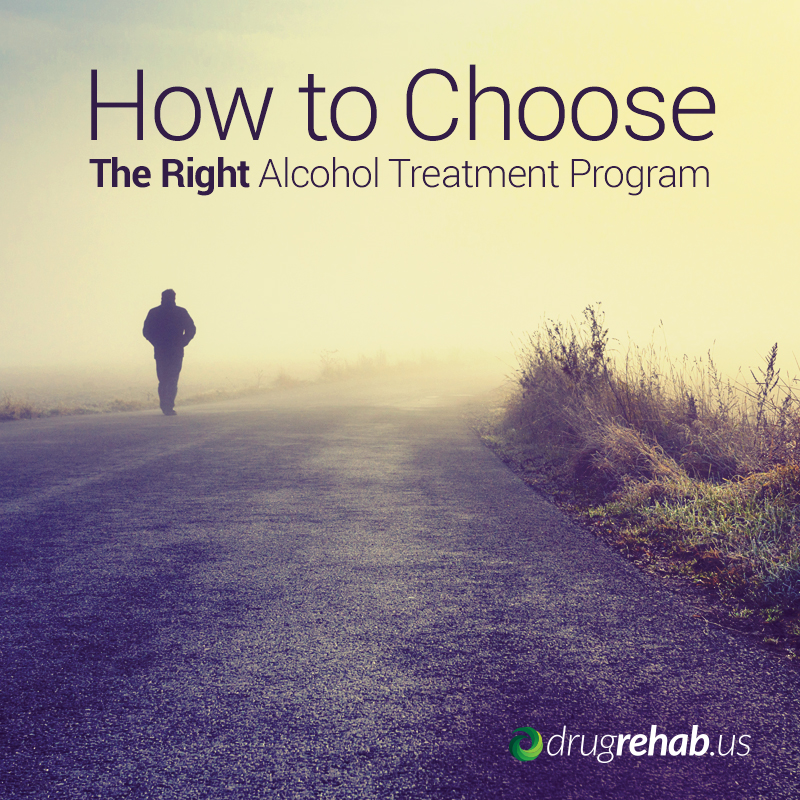 Outpatient counseling – Counseling is useful for anyone who abuses alcohol. On an outpatient basis, it allows the patient to stay at home and to continue going to work or school. This may not be the best option for someone who is a serious alcoholic. Counseling may include group therapy, family therapy or one-on-one counseling.
Outpatient counseling – Counseling is useful for anyone who abuses alcohol. On an outpatient basis, it allows the patient to stay at home and to continue going to work or school. This may not be the best option for someone who is a serious alcoholic. Counseling may include group therapy, family therapy or one-on-one counseling.
- Intensive outpatient program – An intensive program can allow the patient to stay at home, but still receive intense care. This requires a big time commitment, but is good for someone who needs extra support and feels most comfortable staying at home with family.
- Inpatient or residential care – Residential care means staying in a facility for a month or more. This allows the patient to receive intensive, daily care and 24-hour monitoring.
- Sober living – A sober living facility is similar to residential treatment, and may include intensive therapy and treatment. It is often used as a facility for someone who has completed residential care, but is worried about going home. It involves living in a house with other alcoholics in recovery and there are strong social and support components.
- Support group – A support group is a meeting of people trying to cut back on drinking or stay sober after going through treatment. Many are anonymous and follow a 12-step philosophy. These groups can be used as a stand-alone treatment or as ongoing treatment for alcoholics already in recovery.
Making The Right Treatment Choice
Now that you know more about the options for alcohol addiction and abuse treatment programs you can help your loved one make a good decision. Think about his needs and his personality and which type of program would suit him best. If he has a strong support system at home, maybe outpatient care would be best. If he can’t be trusted to not keep drinking, a residential facility might help. If he is not yet an alcoholic, but is engaging in dangerous drinking habits, individual therapy or attendance at a support group may be enough to help him make some important life changes.
As you pick out a facility together, make sure you keep a couple of other factors in mind. Look for a program that has good credentials and a well-trained and experienced staff. You should be able to get positive references from any reputable program. Also look for a facility or therapist that will tailor a program to meet the individual needs of your loved one. A rigid plan used for everyone is not going to be effective. If you keep these things in mind and are careful in your selection process, you should be able to find a treatment program that will help your loved one get sober and learn to stay alcohol-free.
Christian Or Secular Drug Rehab – Which Is Right For You? – Let Us Help You Make This Important Decision
03 Nov 2014
Drinking And Stress: A Dangerous Combination
Do you have a glass of wine to unwind in the evening after work? Do you reach for a cocktail after a stressful situation? Do you start to look forward to your evening drink earlier in the day when you’re feeling stressed? If you can say yes to any of these questions you are probably using alcohol to cope with stress. Drinking can make you feel momentarily looser, calmer and more relaxed, which is why many people use it to unwind. Doing so is a dangerous habit, though. You can make your stress worse by drinking and even risk becoming dependent on it.
Alcohol As Stress Relief
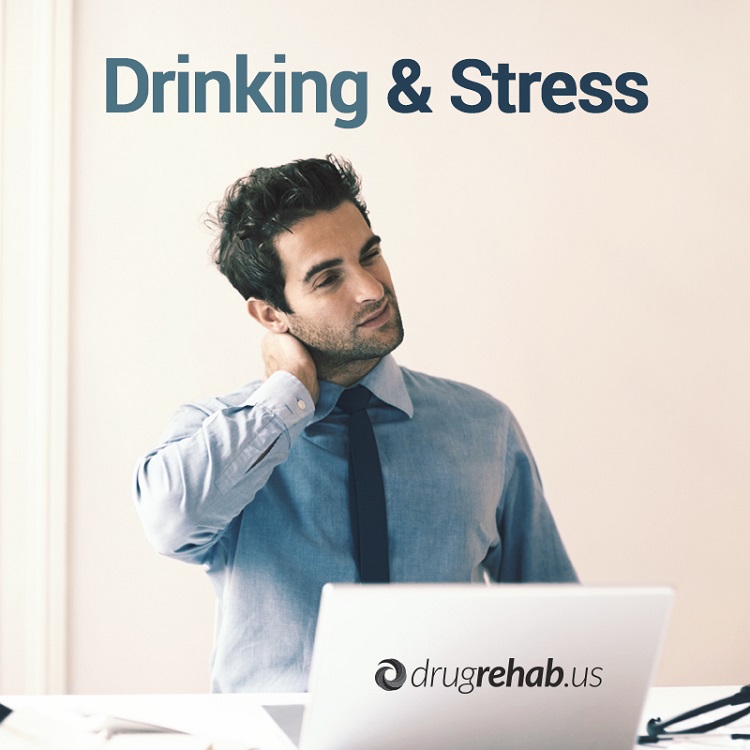 Many people turn to drinking to relax and ease the everyday stresses of modern life. Most of us are busier than ever. We have demanding jobs, and in a rough economy, holding onto those jobs becomes crucial. We often sleep poorly and get too little exercise. Our diets are not always the best. On top of all this you may have other stresses in your life: troubled relationships, financial problems, trauma, a death in the family, etc.
Many people turn to drinking to relax and ease the everyday stresses of modern life. Most of us are busier than ever. We have demanding jobs, and in a rough economy, holding onto those jobs becomes crucial. We often sleep poorly and get too little exercise. Our diets are not always the best. On top of all this you may have other stresses in your life: troubled relationships, financial problems, trauma, a death in the family, etc.
Why wouldn’t you want to drink to feel better? Hanging out with friends at the bar and having a few cocktails or beers are fun activities. It’s no wonder many of us engage in drinking to diffuse stress. In the short term it can make you feel better, especially when you add in the socializing time with friends. In the long term, however, drinking can send your stress levels spiraling upward.
The Stress-Drinking Cycle
Researchers have shown that stress and drinking effect each other and result in a cycle of interaction that leads to worsening stress. One study found that alcohol changes how the body copes with stress. Drinking can actually reduce the stress hormones your body produces in difficult situations, but it also prolongs the tension that you feel associated with stress.
On the flipside, stress changes the way alcohol impacts your mood. When you are stressed and you drink you will crave more alcohol. You will also find that the positive feelings you normally get from alcohol are reduced. This interaction between stress and alcohol that goes on inside your body means that drinking actually worsens your stress. As your stress gets more intense, you may drink more and the cycle continues. Drinking will never cure you of chronic stress.
If you continue to use alcohol as a means of relaxation and stress relief you run the risk of falling into the stress-alcohol cycle. And if you land in that cycle you could end up becoming dependent on alcohol. Alcoholism is a disease and it takes a serious toll on both the mind and the body. Becoming an alcoholic means more stress in addition to physical health problems.
Healthy Stress Relief
One of the ways in which friends can be good for your mental health is when you interact in a social group. Having good social support can make you more resilient in the face of stress. Hanging out with friends and family, talking, laughing and having a good time helps to relieve stress that you already have. If you can keep the social engagements, but take out the alcohol, or at least reduce it significantly, you will have a powerful prescription for managing your stress. Add to your social interactions a healthy diet, plenty of exercise, downtime engaging in fun activities and you have a healthy stress relief plan and no need for that next drink.
Do You Find Yourself Drinking More And More To Relieve Stress? Call Us Now For Help!
22 Oct 2014
Alcoholics And Their Excuses
Alcoholism is a disease. It is chronic and it requires lifelong treatment to stay sober. While going through rehab and staying sober are challenging, the first and biggest step for an alcoholic is to get past the excuses and admit to having a problem with drinking.
 Heavy drinkers deny having a problem for a variety of reasons. They fear what happens in detox. They worry about what people will say. Most of all they fear what life will be like sober.
Heavy drinkers deny having a problem for a variety of reasons. They fear what happens in detox. They worry about what people will say. Most of all they fear what life will be like sober.
In spite of the fears, it is important for alcoholics to get help. The consequences of not doing so may be serious.
Pregnant alcoholics risk fetal alcohol syndrome. All alcoholics face health consequences like liver or heart disease. Accidents are common among alcoholics. They also must face the possibility of losing relationships.
Excuses Of An Alcoholic
If you have a loved one who drinks too much, confront him or her. Be prepared to hear this list of excuses alcoholics give to explain drinking:
- I need to drink to feel comfortable in social situations – Many people face social anxiety. It is a real disorder, in fact. It is not uncommon to self-medicate with drugs or alcohol, but it is not a good excuse. Self-medicating is dangerous. Therapy can help anyone overcome social anxiety.
- I’m only hurting myself – Addicts are great at claiming that their habit is their own business. Remind your loved one that drinking affects everyone else too. When drinking makes the alcoholic remote, angry or temperamental, everyone suffers. When drinking costs the family money, everyone suffers.
- I need alcohol to cope with work stress – This is a common excuse. Stress relief is an important part of being healthy and a drink or two on tough days does not make one an alcoholic. Many jobs are stressful and drinking feels good. This may be why there is so much alcoholism in the healthcare field and other high-stress careers. It isn’t an excuse for heavy drinking, though. There are many other ways to cope with stress.
- This is just who I am – This excuse is an outright lie. Alcoholics weren’t born drinking. They change to become an alcoholic and they can change again to get sober.
- I’m not as bad as other people – Comparing a drinking problem to a worse problem in someone else is a very weak excuse for drinking. Being an alcoholic exists outside of everyone else. When considering a personal problem, like drinking, it makes no difference what everyone else is doing.
Professional And Caring Help Is Needed
The list of excuses that alcoholics make could go on and on forever. They will come up with anything under the sun to justify continuing to drink and to avoid getting help. When the excuses finally run out, you can hopefully convince your loved one to get much-needed help. Only professional therapy and counseling, along with your support, will be enough to overcome all the excuses.
See How To Recognize The Signs Of Addiction Denial In A Loved One
If Your Loved One Needs Help With A Drinking Problem, Reach Out To Us Today – We Will Help You And Your Loved One Take That First Step!
15 Oct 2014
Should I Try Medications For Alcoholism?
There has long been a prevalent philosophy of addiction treatment that includes total abstinence. Of course it makes sense for an alcoholic to abstain totally from drinking, but some also say you should avoid drugs wherever you can, including medications. Ideas are changing, though, thanks to research.
We now know much more about addiction and its effect on the brain than ever before. Researchers have developed medications that may be able to help you recover more effectively and stay sober more easily. Not all agree that drugs are the way to go, so what should you do?
What To Do When Deciding Whether Or Not To Try Medications For Alcoholism:
Read Up On Drugs For Treating Alcoholism
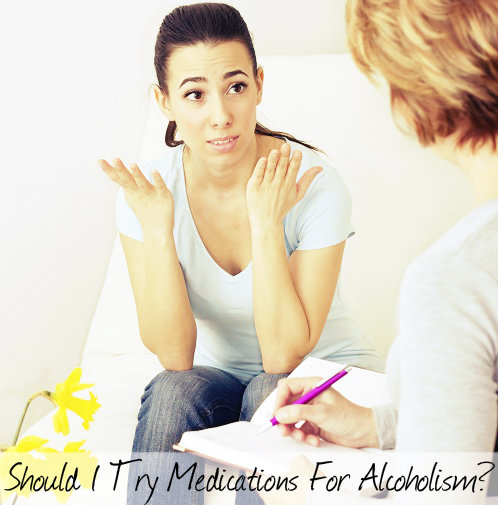 The first and best thing you can do when it comes to making a choice about medications is to read and learn. Knowledge is power, so read up on the drugs available to treat alcoholism and learn more about each one. Armed with the information, you can make a better choice and have a more intelligent discussion with your doctor and therapist.
The first and best thing you can do when it comes to making a choice about medications is to read and learn. Knowledge is power, so read up on the drugs available to treat alcoholism and learn more about each one. Armed with the information, you can make a better choice and have a more intelligent discussion with your doctor and therapist.
3 Common Alcoholism Treatment Drugs
Here is some introductory information to get you started learning about three of the most common drugs:
- Antabuse – The generic name for this drug is disulfram, and it has been around for decades helping alcoholics stop drinking. If you take the medication as directed and try to drink, you will get very sick. Symptoms are short-lived and include nausea, vomiting and headaches.
- Naltrexone – Naltrexone blocks the high, or pleasant feeling, that you normally get when drinking alcohol. If you take it as directed, you will have no reason to drink.
- Acamprosate – This is one of the newer drugs on the market for alcoholics and it works by helping you to resist the urge to relapse. You are only supposed to take this medication after you have given up drinking. It reduces some of the long-term withdrawal symptoms that would make you turn back to drinking.
Discuss Treatment Medications With Your Doctor And Therapist
You should always discuss your treatment plans with those experts you trust to your care. Of course your doctor will be the one to prescribe a medication, or your psychiatrist if you have one. Discuss the pros and cons with both your prescribing doctor and your therapist or drug counselor. These professionals can help you make an informed decision about whether alcoholism medications are right for you.
The most effective addiction treatment plan is one that is tailored to your specific needs. You, along with the professionals who know you and your history, are best qualified to develop a plan, whether or not it includes medications.
Never Rely Solely On Medication To Overcome Your Addiction
If you decide to give one or more of these medications a try, keep in mind that none of them is designed to be used alone. All are approved to treat alcoholism in conjunction with psychosocial therapy. This means that you need to use other treatment methods, including behavioral therapy, psychotherapy and support groups together with drugs for effectiveness. Drugs alone are not the answer because there is no simple cure for alcoholism or any other type of addiction.
The ultimate choice as to whether or not you try drugs to treat your addiction is up to you. In order to make the best choice for yourself and your future, make sure you are educated about the options, discuss with your medical and counseling professionals and make medications just one part of an overall treatment plan. If you follow these steps and make the commitment to stick to your plan, you stand every chance of a successful recovery.
See Other Drug And Alcohol Rehab FAQ’s
02 Oct 2014
What Hangovers Can Tell You About Your Drinking
Drinking is a risky behavior. You can have an accident. You can drink too much, black out and forget what happened the night before. You can end up saying things you regret. And, of course, most of us have experienced the dreaded morning-after hangover. If you drink responsibly and moderately, you don’t have to worry about these things.
Types Of Hangovers And What They Say About You And Your Drinking
If you are questioning whether your drinking habits are risky or getting out of control, let your hangovers be your guide; they can be illuminating.
The Occasional, Regrettable Hangover
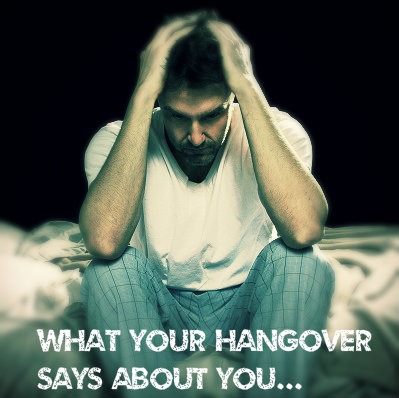 An occasional hangover is not that unusual for the moderate social drinker. We all have those regrettable moments when we go one drink too far. The next morning you wake up with your tongue stuck to the roof of your mouth, the room spinning and your head pounding. You try to remember what went wrong the night before and then slug back water in a desperate attempt to feel normal again.
An occasional hangover is not that unusual for the moderate social drinker. We all have those regrettable moments when we go one drink too far. The next morning you wake up with your tongue stuck to the roof of your mouth, the room spinning and your head pounding. You try to remember what went wrong the night before and then slug back water in a desperate attempt to feel normal again.
This type of hangover, if it occurs once or twice a year, is probably not a big deal. And it is not likely to be indicative of a drinking problem. It’s normal to make this mistake and only if you never drink or you rule your drinking with an iron fist will you never have a hangover.
The Slight, But Constant Hangover
A hangover can come in a range of severities. For most normal drinkers, the worst hangovers are rare because we learn our lessons, at least for a while. The normal reaction to a bad hangover is to avoid drinking too much in the future. But what if you drink regularly and wake up most mornings with mild symptoms? Maybe you have a slight headache or you just feel unrested, like you didn’t sleep well.
This mild kind of hangover, occurring several times a week, is a sign that you are developing a drinking problem. If you truly drink moderately, meaning one to two drinks at a time no more than a few nights a week, you shouldn’t feel bad in the mornings. These little hangovers are telling you that you are drinking too much and you are drinking too often. Just because you aren’t experiencing a full-blown morning-after event doesn’t mean you aren’t abusing alcohol. Slow down and cut back now before it gets worse.
The “I’ll Never Feel This Way Again” Hangover
I’ll never drink like that again! Have you ever said this before? Most of us have, which is fine if you act on that sentiment. If you find yourself saying or thinking this, but tack on an “until next weekend,” you have a problem. Not adjusting your behavior in response to a bad hangover is not normal and it indicates that you are drinking too much too often. Try to cut back and if you find that you are struggling to do so, you may need some professional help or a support group.
The Hair Of The Dog Hangover
What if you have regular hangovers and to get through them you have a little morning drink? This is a sign that you are already on a dangerous path. If you need a drink to help you feel better in the morning, you could be well on your way to alcoholism. Stop drinking now and turn to professionals for help. If you’re not sure where to turn, start with a trusted friend or family member who cares about you. You need support now more than ever.
Listen To What Your Body Is Telling You And Get Alcohol Abuse Help
Hangovers are no fun and how often and how badly you have them, and how you respond to them, can tell you a lot about your drinking and whether it’s problematic. Listen to what your body is telling you and adjust your drinking behaviors or get the help you need.
Learn More – Moderation vs. Abstinence: Which Works Best For Problem Drinkers?
24 Sep 2014
How To Come Out As A Recovering Alcoholic
Being an alcoholic means living with a lifelong disease. If you have gone through rehab or any other form of treatment and are now in recovery you have taken huge steps to get back control of your life and to treat your disease. Remember that addiction is chronic and that you need to treat it for the rest of your life. This means that it will always be a health concern for you. No matter how long you have been sober, a relapse is always possible.
With something so big going on in your life, it doesn’t make sense to keep it a secret from your friends and family members. So how do you come out and tell people? It will be scary at first, but know that your loved ones will support you.
Steps To Come Out And Tell People You’re A Recovering Alcoholic
Start slowly and take this advice:
 Start With A Support Group – The people who will be most sympathetic to your alcoholism are those who also struggle with the disease of addiction. Joining a support group is a great tool for maintaining your sobriety and a useful way to practice talking about your addiction and recovery. The members of your support group will be supportive. No one there will reject you or ridicule you. Tell your story here and you will start to feel more comfortable opening up to others.
Start With A Support Group – The people who will be most sympathetic to your alcoholism are those who also struggle with the disease of addiction. Joining a support group is a great tool for maintaining your sobriety and a useful way to practice talking about your addiction and recovery. The members of your support group will be supportive. No one there will reject you or ridicule you. Tell your story here and you will start to feel more comfortable opening up to others.
- Tell Your Sober Loved Ones Next – The sad fact is that the friends with whom you used to drink may not support your new sobriety. They may take your admission of alcoholism as an accusation that they too have a problem. This comes from a defensive standpoint and denial on their parts, but for you it can feel hurtful and devastating. You can confront these friends eventually, but start with your sober loved ones. They are more likely to be loving and supportive of the changes you’ve made in your life.
- Arm Yourself With Information – When you talk to your loved ones about being in recovery, be prepared to educate them about the disease of alcoholism. Most people still have no idea what addiction really is, that it is an illness. Talk to them about your personal experiences and why you felt you had to stop drinking, but also about alcoholism in general. Help them to understand the disease and they will be better able to support you.
- Tell Your Friends And Family What You Need – It is also important that you provide your loved ones with details about what you need from them. It may be confusing for them. If you need them not to drink around you, make that clear. If you can’t meet up in a bar, make sure they know that. They will want to help, but will need to know how.
- Be Patient And Give Your Loved Ones Space – In spite of your best efforts, some of your loved ones may not take the news well. Be prepared to give them space if needed. The bad reaction will probably be due to shock. Provide them with resources about alcoholism and give them time and space. They will come back to you when they’re ready.
Telling people that you are an alcoholic in recovery is never easy. It is important, though, because your disease is a part of who you are. When you take the time to educate the ones you love and tell them what you need for support, you may be surprised at just how much support you receive.
If You Need Help With Your Addiction Recovery – Call Us Now – We Are Here Just For You!
09 Sep 2014
The Long-Term Effects Of Underage Drinking
Prom, graduation and the start of summer vacation are all key times that trigger a rash of underage drinking. Unfortunately, teenage drinking is a year-round problem. Underage drinking can have some very serious immediate consequences.
Drinking too much can make a young person sick. It can lead to poor decision-making. It can lead to accidents. At the very least, drinking can make a young person feel awful the next day. What many young people fail to consider is that there are lasting consequences too.
Effects Of Long-Term Underage Drinking
Whether you’re a teen yourself or the parent of a teen, understand the long-term implications of underage drinking:
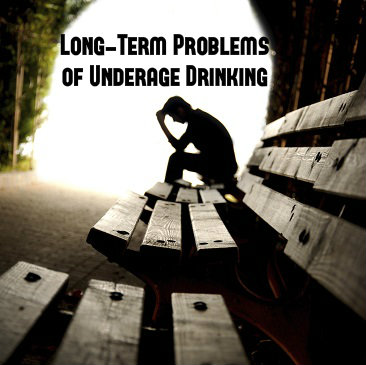 Legal Troubles – Most teens don’t think about getting caught before they drink, but many make bad choices when they do. These poor decisions can get a teen arrested for disorderly conduct, breaking and entering, drunk driving and more. The legal consequences can follow a young person for years, interfering with applications for college, scholarships or for jobs.
Legal Troubles – Most teens don’t think about getting caught before they drink, but many make bad choices when they do. These poor decisions can get a teen arrested for disorderly conduct, breaking and entering, drunk driving and more. The legal consequences can follow a young person for years, interfering with applications for college, scholarships or for jobs.
- Chronic Health Problems – When drinking starts at a young age and continues into adulthood, the accumulated effects can mean serious health problems. These may include pancreatitis, cirrhosis of the liver, hepatitis, high blood pressure, anemia and nutritional deficiencies. Drinking at a young age has also been shown to negatively impact the development of bone density, which can later result in osteoporosis
- The Brain – Drinking impacts the developing adolescent brain and causes problems that will continue into adulthood. It can cause permanent problems with memory and cause actual physical damage to the brain. The part of the brain involved in memory, the hippocampus, can be seen in scans to be smaller in people who drank a lot during adolescence than in their non-drinking peers. Other negative impacts include reduced attention spans, ability to think spatially and to plan.
- Accidents, Injuries, And Death – Drinking can lead to any number of accidents from drowning to falling to auto collisions. These have serious short-term consequences, but they can also impact a young person for the duration of their life. If an accident kills a young person, that life is over forever. For the underage drinker that causes a fatality, living with the guilt is a lifelong burden. Injuries may also stick with a young person and cause long-term health problems.
- Addiction – Drinking for the first time as a teen is a risk factor for developing an addiction or a substance abuse disorder later in life. In other words, underage drinkers put themselves at risk for having lifelong struggles with alcoholism or drug addiction.
- Family Problems -When young people drink it can impact the family in many negative ways. All of the terrible consequences that befall the teen drinker, like legal troubles, health problems and accidents, affect the dynamic of the family. Just one drinking incident with bad consequences can start a family crisis and everyone suffers.
The consequences of underage drinking are not difficult to imagine. Anyone who has ever had one drink too many knows just what can happen as a result. What most people, young and old, never think about are the long-lasting consequences. Teens who drink risk becoming addicted, damaging their brains, living with the guilt of hurting someone and having chronic health problems. With all of these and other possible negative outcomes, why would any young person choose to drink?
If You Know A Young Person Who Is Tempted To Drink Or Is Struggling – Call Us Now – We Can Help


